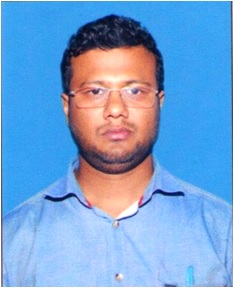Dr. Robin Doley
Professor & Head
Department of Molecular Biology and Biotechnology
Tezpur University, Tezpur-784028, Assam, India
Contact: doley@tezu.ernet.in
https://scholar.google.co.in/citations?user=G6NzdKoAAAAJ&hl=en
Dr. Robin Doley is a Professor in the Department of Molecular Biology and Biotechnology Tezpur University. He did his graduation from Jawaharlal Nehru College, Pasighat and Masters in Zoology from Rajiv Gandhi University, Doimukh, Itanagar, Arunachal Pradesh. He joined the Department of Molecular Biology and Biotechnology, Tezpur University for his Ph.D. degree under the supervision of Prof. A.K Mukherjee in the field of Snake venom Biochemistry and obtained his Ph.D. in 2005. Thereafter he joined as a Post Doc at Prof. R. Manjunatha Kini’s laboratory at National University of Singapore, who is one of the renowned snake venom toxin researchers. During his postdoctoral research, he worked on transcriptomics of venom gland of several medically important and rare snakes of South East Asia and contributed towards the understanding of venom protein evolution. After joining as an Assistant Professor in the Department of Molecular Biology and Biotechnology, Tezpur University in the year 2009, Dr. Doley established his Molecular Toxinology laboratory in the department. His research interest is to understand the variation of medically important snake venoms from different locations of India as well as to understand the structure-function relation of haemostatically active snake venom proteins. Understanding the variation of venom proteins is important as polyvalent antivenom used in India is raised against “Big Four” snakes and used for the treatment of any snakebite victims. Due to variation in the venom composition, this polyvalent antivenom is not so effective. Using proteomic approach, Dr. Doley’s laboratory works to understand the variation of venom composition as well as using antivenomics approach, the immunodepleting capacity of the polyvalent antivenom is being perused. Such study is important to understand efficacy of polyvalent antivenom used for the treatment of snakebite patients. Moreover, using antivenomics approach, non-immunodepleting proteins of snake venom can be isolated and its contribution towards venom toxicity can be evaluated. This will help in designing effective antivenoms, which is the main area of research interest of Dr. Doley. Another other research area of Dr. Doley is the understanding the structure-function relationship of snake venom protein. Since snake venom is a mixture of proteins and polypeptides which induces various pharmacological effects in prey/victims during envenomation, to understand the toxic effects of these proteins and polypeptides, understanding of structure-function relationship is important. His laboratory is involved in characterization of proteins of medically important snake venoms prevalent in this region. The long term goal of his laboratory is to understand the functional properties of snake venom proteins which will provide –
- Better management of snakebite.
- Understanding the mechanism of action of novel proteins.
- Develop research tools and understand normal physiological processes at the cellular and molecular level.
- Drug discoveries from venom proteins.
- Development of diagnostic tools for management of snakebite patients.
So far, Dr. Doley has published 38 research papers in several reputed journals and has completed several projects on snake venom sponsored by DBT, DST and DRDO. Presently, he is working with grants received from DBT, ICMR and BIRAC to work on venom variation and identification of marker proteins of Naja kaouthia and Bungarus fasciatus of North East India for development of diagnostic tools to identify venomous bites. He has supervised several Ph.D. scholars and is presently guiding six scholars.
| Member | Details of students who have completed Ph.D. under the supervision of Prof. Robin Doley |

Dr. Diganta Das |
Thesis title: Studies on the crude venom and purified three-finger toxin of Naja kaouthia from North East India
Present position: Post-doctoral Fellow @ Keck School of Medicine, University of South California, Los Angeles Publications: 5 (Five) Most recent publication: Purification and Characterization of Nk-3FTx, A Three Finger Toxin (3FTx) from the venom of North East Indian Monocled Cobra. Journal of Biochemical and Molecular Toxicology. 30(2): 59-70. |

Dr. Maitreyee Sharma DST INSPIRE Fellow (2011-16) |
Thesis title: Proteomics of Indian Daboia russelii venom (Irula) and characterization of a major protein
Present position: Deputy Director, Directorate of Forensic Sciences, Assam Publications: 5 (Five) Most recent publication: Daboxin P, a Major Phospholipase A2 Enzyme from the Indian Daboia russelii russelii Venom Targets Factor X and Factor Xa for Its Anticoagulant Activity. PLoS One. 11(4): e0153770. Honours and Awards: DST INSPIRE Fellowship Best Oral Presentation at National Seminar on Recent Advances in Snake Venom Research and Snake-bite Therapy: National and International Perspectives held at Tezpur University, Assam from November 22-24, 2016 |
|
DBT-SRF (2011-16) |
Thesis title: Identification and characterization of thrombin inhibitors from the salivary gland of tick (Haemaphysalis bispinosa)
Present position: Post-doctoral Fellow @ National University of Singapore, Singapore Publications: 4 (Four) Most recent publication: Expression and characterization of haemathrins, madanin-like thrombin inhibitors, isolated from the salivary gland of tick Haemaphysalis bispinosa (Acari: Ixodidae) Thrombosis Research. 152: 20-29. Honours and Awards: DBT JRF |

Dr. Simran Kaur DBT-SRF (2014-2019) |
Thesis title: Expression and characterization of recombinant flavikunin a kunitz type serine protease inhibitor from the venom of Bungarus flaviceps
Present position: Junior Scientific Officer , Directorate of Forensic Sciences, Assam Publications: 4 (Four) Most recent publication: Expression and characterization of Flavikunin: A Kunitz‐type serine protease inhibitor identified in the venom gland cDNA library of Bungarus flaviceps. Journal of Biochemical and Molecular Toxicology, 33(4): e22273, 2018, 33(4):e22273, 10.1002/jbt.22273 Honours and Awards: DBT-JRF (2014), GATE (2013 & 14), SLET (2013) |

Dr. Archana Deka DBT-SRF (2015-2020) |
Thesis title: Studies on proteomics of Naja kaouthia venom (North East Indian origin) and role of Cysteine-Rich Secretory Protein in elapid induced inflammation
Publications: 4 (Four) Most recent publication: Naja kaouthia venom protein, Nk-CRISP, upregulates inflammatory gene expression in human macrophages., International Journal of Biological Macromolecules, 160: 602-611 Honours and Awards: DBT-JRF (2016), UGC-NET (2016), ICMR (2016), GATE (2015), SLET (2014) Best Poster award at National Seminar on Recent Advances in Snake Venom Research and Snake-bite Therapy: National and International Perspectives held at Tezpur University, Assam from November 22-24, 2016. |
| Member | Details of students pursuing Ph.D. under the supervision of Prof. Robin Doley |

Rafika Yasmin |
Area of research : Anti-platelet proteins from snake venom
Honours and Awards: UGC-NET (2016), UGC-JRF (2016), GATE (2017) and SLET (2018) |

Susmita Thakur |
Area of research : Venomics and anti-venomics
Honours and Awards: GATE (2018) and SLET (2018) |

Arpita Devi |
Area of research : Snakebite Management
Honours and Awards: UGC-NET (2015), CSIR-JRF (2016 & 2017), GATE (2018) and SLET (2018) |

Amit Talukdar |
Area of research : Snake venom toxinology
Honours and Awards: CSIR-NET JRF (2017) and SLET (2017) |

Mahari Jiumin Basumatary |
Area of research : Anti-platelet proteins from snake venom
Honours and Awards: GATE (2019) and UGC-JRF (2019) |

Mandira Basumatary |
Area of research : Cytotoxic proteins from snake venom
Honours and Awards: UGC-JRF (2016) |


 Dr.Rajeev K. Brahma
Dr.Rajeev K. Brahma

